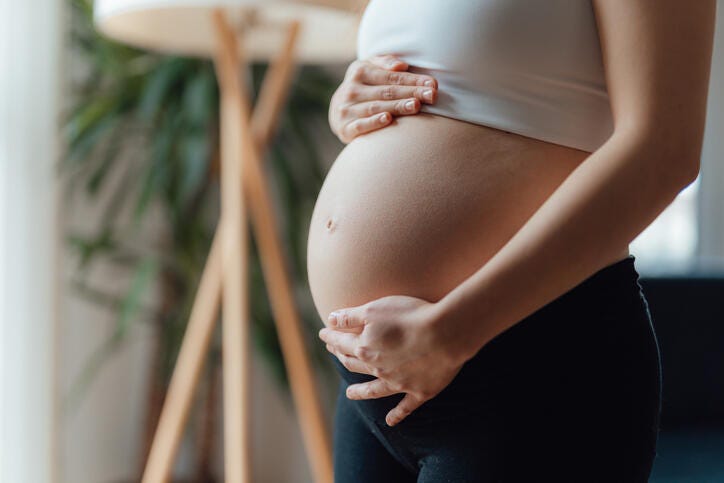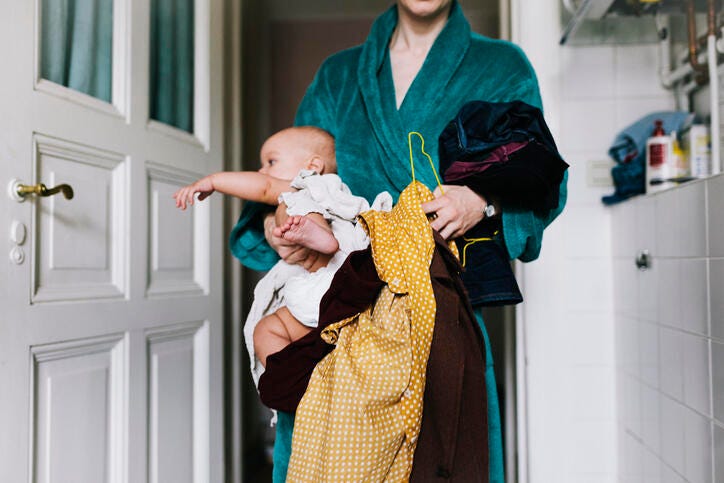
Pregnancy weight takes time to gain, so it takes time to lose it, too.
Oscar Wong/Getty Images
Pregnancy and childbirth are incredible times of growth and change and, yes, weight gain. And while pregnancy weight is often normalized and accepted, sometimes new moms face pressure to instantly lose the weight and get back to a pre-baby size, and that’s not fair. There are multiple reasons why the idea that you need to lose baby weight quickly is problematic. To start, restricting food intake or dieting while breastfeeding as a new mom is counterintuitive to your body’s needs for healing and producing milk.
“There is no rush to get back to pre-pregnancy weight especially if you are breastfeeding,” says Amy Shapiro, a registered dietitian and founder of Real Nutrition. “Maintaining adequate calories is important for milk supply, healing, energy and nourishment.”
That said, it’s normal to wonder when your body might look and feel like your normal self pre-pregnancy. Here’s what you need to know about why it’s difficult to lose weight after having a baby — and why you should be nicer to yourself if you’re frustrated with baby weight.
Five reasons it’s hard to lose weight after baby
Not all baby weight is excess fat: “It’s important to take into account that the baby, blood volume, placenta all weigh about 15 pounds that will be lost immediately,” says Shapiro. Once the initial weight is lost, you’ll need more time to lose the other pounds gained: “You will lose water weight and baby, amniotic fluid and placenta weight quickly, but losing fat pounds takes time and commitment.”
Weight loss can cause decreased milk supply: Not all moms breastfeed, but if you are, you should keep in mind the effects that trying to lose weight too quickly can have on milk supply. “If you are breastfeeding, losing weight too fast can cause a decrease in milk supply,” Shapiro says. “Breastfeeding can also increase your appetite, which may prevent quick weight loss (no matter what celebrities tell you)!”
Less personal time: Being a new mom is a demanding job, no doubt, and the new schedule looks nothing like it did before kids entered the picture. “After you welcome a new baby into the house you may have less free time to exercise, cook or eat the way you want to. This can lead to slower progress,” Shapiro says. But don’t get too discouraged. Shapiro says to give yourself time and patience to learn how to plan and prepare with a baby and form your healthy habits again. Don’t forget it’s OK to ask for help if you’re not finding the time to prepare healthy food or exercise (once a health care provider clears you to).
Less sleep: “With a new baby in the house your nighttime sleep is often disrupted and you can find yourself exhausted during the day. Often when we are exhausted and sleep-deprived, we reach for high-energy, high-carb foods to keep us going,” says Shapiro. “Our willpower also diminishes and we can reach for foods that may not help with weight loss.”
Slow progress with exercise: It takes time to regain strength and stamina after having a baby, not to mention the time it takes to fully heal and recover from birth before you can exercise again. “You’ll have to slowly build up post-pregnancy to your usual fitness level which may take time to rebuild any lost muscle mass. Muscle mass directly affects metabolism so this may decrease the rate at which you lose weight until you build up your muscle again,” says Shapiro.

Being a new mom is an extremely demanding job that can make it difficult to focus on yourself.
Getty Images
Tips for losing baby weight safely
If you are concerned about losing weight after having a baby, keep in mind that in order to lose weight safely, you’ll need to give it time. Losing baby weight takes months, not weeks. “You can not give your baby what it needs if you are running low on fuel, fighting off headaches, and hungry all the time. So go slow and give yourself six to nine months,” advises Shapiro.
Eat healthy and balanced meals
“After you give birth you should eat a nutritious diet to help your body heal. This means eating adequate amounts of calories, protein, carbs and fat to ensure your body has enough energy to heal, repair, and keep up with new life demands,” says Shapiro.
“To lose weight you need to improve the quality of your food, but also not consume more than you need,” Shapiro continues. Listen to your body and eat when you’re hungry. Also be aware of stress and emotional eating, since this is often when we reach for junk. “This is a delicate balance especially when you are exhausted, stressed or anxious about juggling all the new things in your life.”
Try not to reach for “fast energy”
Fast energy foods like processed sugar and carbs (cakes, cookies, etc.) are extra tempting when we are exhausted and hungry. Shapiro suggests being mindful of not reaching for these goodies. Instead, find “sustainable energy foods” — whole, unprocessed foods that provide a balance of healthy fats, protein and carbs from sources like whole grains — to help prevent that extra weight gain.
Exercise when you are cleared to do so safely
“Lift weights or do body resistance training to build muscle safely. This will increase or sustain metabolism to allow for adequate caloric burn,” says Shapiro. “Do not be afraid to work with a professional who can encourage you and make sure you are meeting your goals healthfully,” she says.
Working with a dietitian or nutritionist is always a good idea when you’re feeling lost or uncertain about your nutrition needs and want extra support. There are also plenty of personal trainers who are certified in post-natal fitness and specialize in helping you workout safely after having a baby.
Be nice to yourself and take off the pressure
Finally, Shapiro emphasizes the importance of recognizing the truly amazing thing your body just went through and avoid punishing yourself to get back to “normal.” After all, she says, just as it took time to create a baby, it will also take time to lose that weight.
“Recognize your body has changed and had to make room for the baby you were carrying. Your hip bones may have spread, your ribs may have spread, your stomach muscles may have spread. These things do not just snap back into shape. It takes time to let them go back to where they used to be. Being patient is hard, especially since you have given your body over to another being for almost a year,” Shapiro says, “but there is no race, and no one is judging you.”
The information contained in this article is for educational and informational purposes only and is not intended as health or medical advice. Always consult a physician or other qualified health provider regarding any questions you may have about a medical condition or health objectives.


